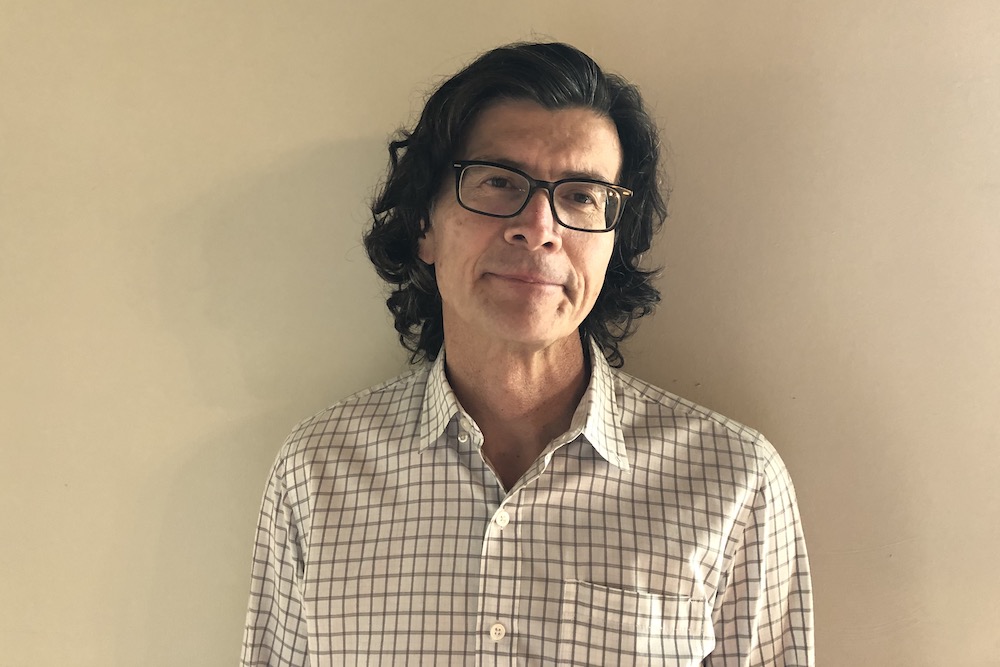
Steven Raphael is a public policy professor at UC Berkeley. Before joining “Has California Ended Mass Incarceration?,” a Zócalo/California Wellness Foundation event, co-presented with UC Center Sacramento, Raphael spoke in the green room about the scent that reminds him of his grandmother, binge-watching videos of comedians, and his happy place.
What is your hidden talent?
When I’m not being an economist and a professor, I play jazz guitar. When I was probably about 18 or 19 years old, my girlfriend—who’s now my wife—bought me a guitar. I learned how to play, and it’s stuck.
What’s your most evocative scent?
Scents that remind me of my grandmother.
My grandmother was from Central America, and she would come visit us a lot. There was sort of a—I don’t know—damp smell in her suitcase and the things she would bring to the house. It was very distinct—it just smelled like someone coming from a place where it rained a lot, and it was tropical. Even when I go to Costa Rica today to visit, it’s something that I remember.
What is the last good book you’ve read?
I read the biography of George Washington called You Never Forget Your First [by Alexis Coe]. It’s a modern take on George Washington and was quite fascinating.
I know you’re not supposed to judge books that way, but it has a great cover, and I thought the title was so clever, and I heard an interview with the author, so I just picked it up.
What was the last thing you binge watched?
I watch late night comedians on YouTube a lot—[Stephen] Colbert, Trevor Noah … I can binge watch their videos for hours and hours, although I try not to because I’ve got a lot of work to do.
Speaking of work, where do you do your best work?
We have a converted garage in my house where I have a desk and all my music stuff. So I spend an enormous amount of time in that room. It’s my happy place. I have a lot of guitars hanging on the wall. And so even though I’m not playing them all day, I’m staring at them all day. It’s just a reminder of having balance in life and interests, and things to do that you enjoy and that you’re passionate about.
How many guitars do you have?
I have three go-tos that I use all the time. And then there’s four or five others that have been collected over the years. So there’s probably about seven or eight. And then my son’s a guitar player, too, so there’s three or four of his. And my daughter has a couple instruments. So there’s a lot of instruments in that room.
What’s one topic in criminal justice reform that is under-covered?
A big topic—where, frankly, it’s a little under-researched—is ways to address use of force, and the consequences of use of force by law enforcement. So it’s an area that is relatively understudied, and one where there’s great demand for good advice.
I think the reason why there’s a gap in research is because it’s something that’s very hard to study. For example, it’s not uncommon for people talk about de-escalation and creating distance in space and time. And that is largely based on experience and reasoning, but it’s just very difficult to generate variation that would allow you to study the outcomes under different practices, simply because there’s so much at stake, and it would be unethical to experiment that way. So I think for that reason, the questions are very hard. And they’re very much tactical issues associated with difficult situations. And so it’s inherently a hard thing to study. And then on top of that, I think oftentimes, the data that exists isn’t as full and complete and as detailed as one would like to be able to study a question like that.
What was the last thing that inspired you?
I see inspiration everywhere these days. There are so many people that are just going above and beyond. Despite all of the grief and tragedy that we’ve all experienced, you can be inspired by the people who are still going to work and going to the hospital and just exposing themselves to risk to help others. It’s very humbling. This is not a happy time, but I think that there’s an enormous amount of inspirational activity just around us every day.
And last question: What’s the last thing you listened to?
I’m opening up Spotify to see what’s there… It’s “One Time, One Night” by Los Lobos.



